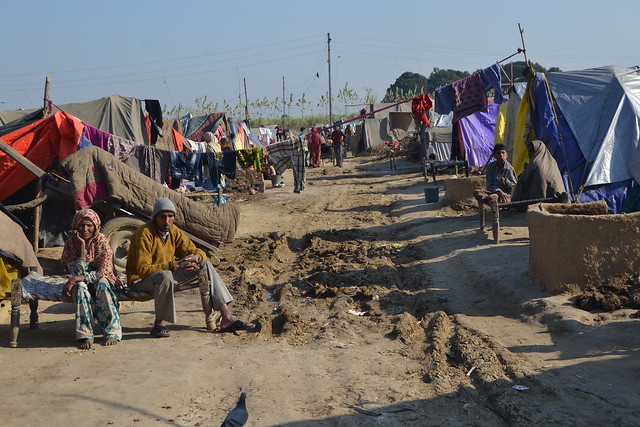By Arun Kumar ,
Washington: India had the highest level of social hostilities involving religion in 2013, while China had the highest level of government restrictions on religious beliefs and practices, according to a new study.
Worldwide, social hostilities involving religion declined somewhat in 2013 after reaching a six-year peak the previous year, according to the Pew Research Center’s latest annual study on global restrictions on religion released here Thursday.

File photo of a relief camp where victims of Muzaffarnagar riot took refuge after September 2013 communal tension.
But roughly a quarter of the world’s countries are still grappling with high levels of religious hostilities within their borders, it found.
These types of hostilities run the gamut from vandalism of religious property and desecration of sacred texts to violent assaults resulting in deaths and injuries.
Looking at the overall level of restrictions – whether resulting from government policies or from hostile acts by private individuals, organizations and social groups – the study found that restrictions on religion were high or very high in 39 percent of countries.
Because some of these countries (like China and India) are very populous, about 5.5 billion people (77 percent of the world’s population) were living in countries with a high or very high overall level of restrictions on religion in 2013, up from 76 percent in 2012 and 68 percent as of 2007.
The number of countries and territories with a “very high” level of social hostilities involving religion fell from 20 in 2012 to 17 in 2013.
Most of the countries and territories in this category, including Israel, India, Pakistan, the Palestinian territories and Nigeria, already had very high social hostilities.
There was a decrease in the number of countries in which Hindus were harassed, from 16 in 2012 to nine in 2013. The number of countries in which Buddhists were harassed stayed roughly the same (12 in 2013, compared with 13 in 2012).
The world’s two largest religious groups, Christians and Muslims, who together make up more than half of the global population, continued to be harassed in most countries.
There was a notable increase in the number of countries in which Jews and adherents of folk religions were harassed, the study found.
Among the world’s 25 most populous countries, the highest overall levels of restrictions were found in Myanmar, Egypt, Indonesia, Pakistan and Russia, where both the government and society at large impose numerous limits on religious beliefs and practices.
The new study also found that the share of countries with high or very high levels of social hostilities involving religion dropped from 33 percent in 2012 to 27 percent in 2013, the most recent year for which data are available.
(Arun Kumar can be contacted at [email protected])
